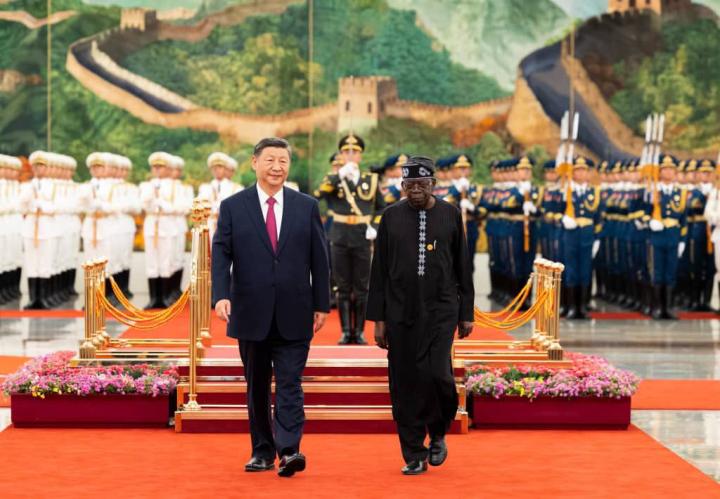Nigeria has secured a landmark $20 billion investment commitment from China, aimed at accelerating development across several key economic sectors including manufacturing, energy, mining, steel, and agriculture. The agreement signals a major step in Nigeria’s drive to attract foreign direct investment, diversify its economy, and boost local industrial capacity.
The investment deal was finalized during high-level bilateral discussions between Nigerian government officials and Chinese business and government representatives, held in Beijing. It follows a series of strategic engagements under the Nigeria-China partnership framework that have been ongoing since late 2024. The recent agreement marks one of the largest single investment pledges Nigeria has received from any country.

According to senior officials involved in the negotiations, the $20 billion commitment will be spread across multiple projects, with emphasis on infrastructure development, gas industrialization, renewable energy, and manufacturing value chains. Nigeria’s Ministry of Industry, Trade and Investment has been designated to coordinate the implementation of the projects, with oversight from the Presidency.
A flagship project under the deal is the development of the Ogidigben Gas Revolution Industrial Park located in Delta State. The massive complex is expected to become Africa’s largest integrated gas-based industrial hub, hosting petrochemical plants, fertilizer production, power generation facilities, and export terminals. The project is anticipated to generate thousands of direct and indirect jobs during construction and operation.
Also included in the investment plan is significant funding for the local manufacturing of solar panels, lithium batteries, and electric vehicles. China is also expected to support Nigeria’s growing steel sector through technical partnerships and supply chain integration with Nigerian operators. The overall aim is to reduce Nigeria’s reliance on raw material exports and encourage local value addition across various industries.
Officials say the deal also includes capacity-building programs and knowledge transfer agreements. These are intended to ensure Nigerian engineers, technicians, and entrepreneurs are trained in new technologies and manufacturing techniques that can be applied locally to sustain the sectors beyond the lifespan of Chinese involvement.
Nigeria’s Minister of Industry, who was part of the negotiating team, described the investment as a “turning point in Nigeria’s industrialization journey.” He noted that the collaboration was carefully structured to ensure transparency, alignment with Nigeria’s national development plans, and long-term sustainability.
In addition to the manufacturing and industrial investments, the agreement includes energy infrastructure development, particularly for renewable energy generation and rural electrification. Small hydroelectric and solar projects are expected to be built in underserved communities across the northern and central regions of Nigeria. These projects are projected to provide power to over 15 million Nigerians who are currently without access to reliable electricity.
Chinese financial institutions are also involved in the deal, with structured loan packages and equity investment facilities set to support the rollout of projects. Nigeria’s economic management team has stated that financing terms were negotiated to ensure debt sustainability and limit fiscal exposure, given concerns around growing public debt levels.
Economic experts and analysts have cautiously welcomed the development. While praising the scope and ambition of the investment deal, they have called on the Nigerian government to ensure that contract transparency, community engagement, and labor protections are observed. Some have also highlighted the need to prioritize local content and ensure Nigerian firms benefit from procurement and subcontracting opportunities.
Concerns have previously been raised in other African countries over Chinese-funded projects, particularly around issues of job displacement, environmental standards, and dependency. Nigerian officials have pledged that robust monitoring frameworks will be put in place to mitigate such risks and ensure Nigeria’s long-term interests are safeguarded.
Furthermore, several trade and industry groups have expressed optimism about the deal, especially its potential to stimulate small and medium enterprises (SMEs) and boost Nigeria’s export competitiveness. With the African Continental Free Trade Area (AfCFTA) agreement in motion, local industries in Nigeria stand to benefit from increased capacity, if well-leveraged.
As Nigeria grapples with high inflation, unemployment, and foreign exchange shortages, such a large-scale investment could provide a needed stimulus. The government is optimistic that the projects, once underway, will not only support economic growth but also contribute to food security, innovation, and regional trade leadership.
The Nigeria-China partnership continues to evolve into a broader strategic alliance, one that is increasingly central to Nigeria’s development aspirations. With the successful execution of this $20 billion agreement, observers say Nigeria could set a template for other African nations seeking equitable and impactful foreign investments.
While challenges remain, the bold scope of the agreement has raised expectations that it could significantly change the trajectory of Nigeria’s economy in the coming years. The focus now turns to implementation, and whether the projects can begin delivering real benefits to Nigerians across the country.
Support InfoStride News' Credible Journalism: Only credible journalism can guarantee a fair, accountable and transparent society, including democracy and government. It involves a lot of efforts and money. We need your support. Click here to Donate
